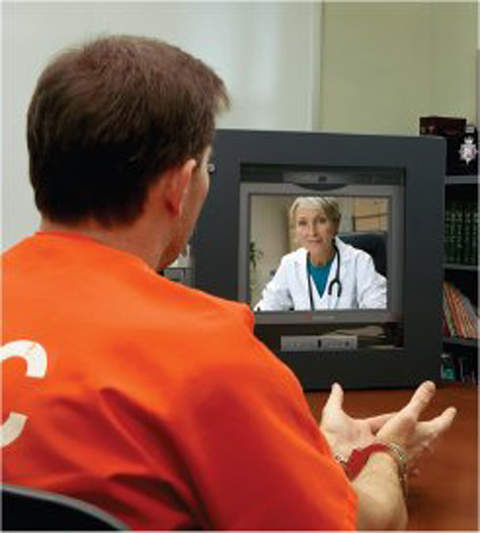The Michigan Department of Corrections (MDOC) manages 48 correctional facilities across an area of 58,110 square miles. The agency administers a range of functions – from medical care to parole hearings – for nearly 49,000 prisoners, 19,000 parolees and 57,000 probationers. From its headquarters in Lansing, MDOC must oversee operations and prisoners cost-effectively and safely. But with some corrections facilities located as far as 560 miles from Lansing, that difficult job is even more daunting.
Using Polycom videoconferencing and high-definition (HD) telepresence solutions, MDOC has found a way to link its broad network of correctional facilities via an expanding videoconferencing infrastructure. With 85 videoconferencing locations spread throughout the state, MDOC keeps costs in check by providing telemedicine services such as:
- Tele-psychiatry consultations
- Tele-nephrology consultations
- Tele-dietary consultations
- Tele-infectious disease consultations
The agency also relies on videoconferencing to streamline an extensive array of administrative functions that previously required in-person visits – road trips that forced employees to spend hours or days away from the office while incurring significant travel expenses. These include:
- Misconduct hearings
- Social Security Administration and Immigration hearings
- Federal and State Courts witness testimony, arraignments, and hearings
- Attorney General and Labor Relations witness interviews
- State Appellate Defender Office attorney visits
To ensure widespread availability to those functions and services, MDOC has deployed 144 Polycom systems ranging from Polycom® HDX™ 8000 telepresence solutions, including the Polycom Practitioner Cart™ units, to Polycom PVX™ video conferencing software for PCs. Polycom systems equip staff at every MDOC facility, no matter how remote. With the Polycom MGC™+50 Readi Convene™ conferencing bridge, staffers can communicate and collaborate with professionals in Jackson and throughout the MDOC system. And using a Polycom management solution, MDOC vastly simplifies the management and scheduling of its videoconference infrastructure, both of which are key to efficiently operating the network.
Taking a strategic view
As early as 1996, MDOC administrators saw how strategic use of videoconferencing solutions could help the agency manage its corrections facilities. Mounting operational costs – back then, Michigan spent $10 million a year for prisoner transportation alone – prompted the agency to launch a pilot program offering telemedicine services to four locations.
Success with the pilot led to a more expansive effort. Today, MDOC’s telemedicine program enables physicians located in Jackson to evaluate patients, provide follow-up care, and prescribe treatment and medications to prisoners located at any MDOC facility. On an appointment-based schedule like that found in any clinic, physicians confer with nurses and nurse practitioners located at remote MDOC facilities.
Managing infectious disease – including HIV and hepatitis C – is a primary focus for MDOC’s telemedicine program. “About 80% of infectious disease cases are seen on video,” says Lynette J. Holloway, videoconferencing coordinator for MDOC’s Bureau of Fiscal Management. Telemedicine sessions are completely interactive, with the physician asking questions of prisoners and nursing staff. Holloway says nephrology (kidney disease) patients also receive much of their initial care via telemedicine: “All nephrology patients are seen by video until they need dialysis.”
Saving costs and ensuring safety
Though patients requiring primary care still travel to local hospitals when necessary, the video consults help MDOC contain operating costs by keeping prisoner transports to a minimum. In 2007, MDOC conducted more than 1,000 telemedicine visits, producing estimated savings of $125,000 in transportation costs alone. Cost savings, however, aren’t the only benefit. MDOC’s reliance on videoconferencing helps protect the public as well.
“We’re starting to pick up emergency psych consults via telemedicine,” says Holloway, who points out that emergency psychiatric evaluations are needed for so-called ‘Level 5’ prisoners – inmates who are particularly violent – the last people you want to put in a car and drive to another location.”
Trimming parole decisions from weeks to days
Michigan’s Parole Board is another benefactor of MDOC’s extensive videoconferencing network. “The parole board looked at what we were doing with telemedicine and saw how videoconferencing could save them time with parole hearings,” notes Holloway. Three members of the ten-member board must evaluate each case, which traditionally required board members to travel to MDOC facilities to conduct hearings in person with prisoners. The use of Polycom videoconferencing systems has transformed Michigan’s parole hearings process, with 13,000 video interviews conducted in 2007.
“It once took two weeks to arrive at a decision,” says Holloway, “and now it takes two days. The interviews are done over the Polycom systems and information is shared electronically. This dramatically increases the board’s capacity to process cases.” MDOC also conducts prisoner misconduct hearings via videoconference. “By keeping officers from having to go on the road to attend hearings in person,” says Holloway, “we save even more time.”
Preparing prisoners for a successful release
Recently, MDOC began to leverage its Polycom network for the Michigan Prisoner Re-Entry Initiative, to equip soon-to-be-released prisoners with strategies and support networks that increase the chance of a successful return to society.
“We put them in contact with an ‘in-reach team’ – counselors and others who can help them successfully deal with release,” explains Holloway, who says videoconferencing connects prisoners with the actual counselors who will work with them after they’re released. “A prisoner incarcerated in Jackson might be released in Detroit, so we’ll put him in touch with an in-reach team in Detroit. That way, they establish a face-to-face relationship with counselors even before they meet in person.”
Making plans to expand
For MDOC’s video conferencing network, the future holds plans for expansion. Holloway says the agency plans to add more locations, while growing the number of services and functions handled by the system. In telemedicine, for instance, MDOC plans to broaden the number of conditions treated via videoconference. “The Polycom system helps us do our jobs more efficiently, and it reduces costs by eliminating travel,” she notes. “The savings we’re seeing – both in money and in time – would be impossible to achieve without videoconferencing.”




